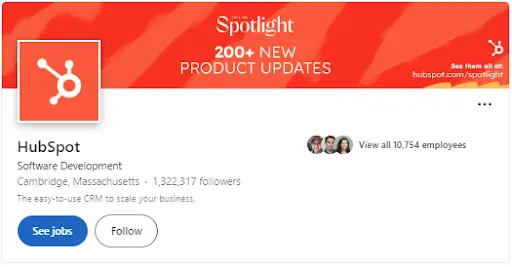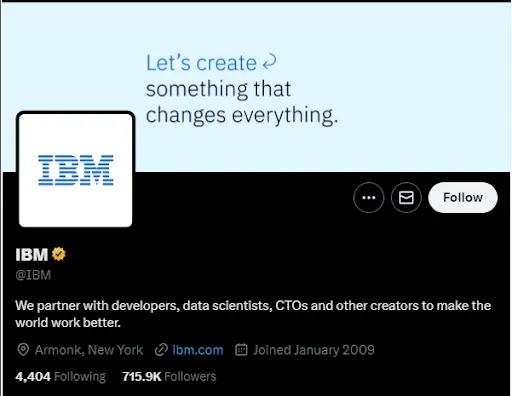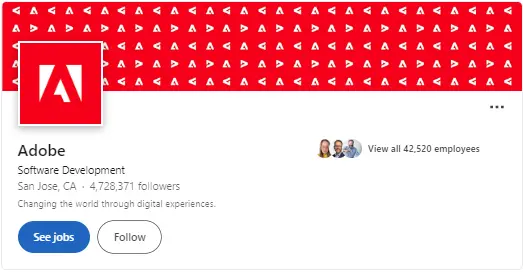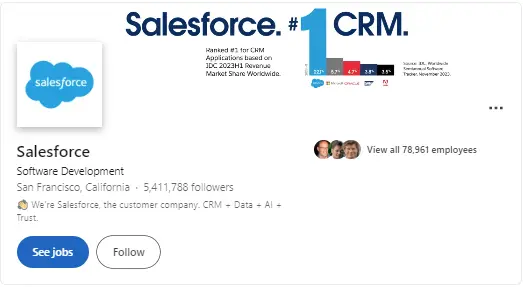B2B Social Media Marketing: How to Build a Strategy That Works
In the contemporary digital landscape, social media marketing has become mandatory for B2B companies striving to enhance brand visibility and attract quality leads. However, the benefits of a successful marketing strategy designed for various social platforms are undeniable. Not just the B2C companies, but B2B businesses are equally eager to learn the new marketing tactics for social media. The digital world is changing rapidly. You can miss a lot of opportunities if you do not keep an eye on the evolving digital trends and marketing methodologies.
This guide delves into building an impactful B2B social media strategy while offering practical tips and real-world examples.
Keep reading!
How to Build an Effective B2B Social Media Strategy?
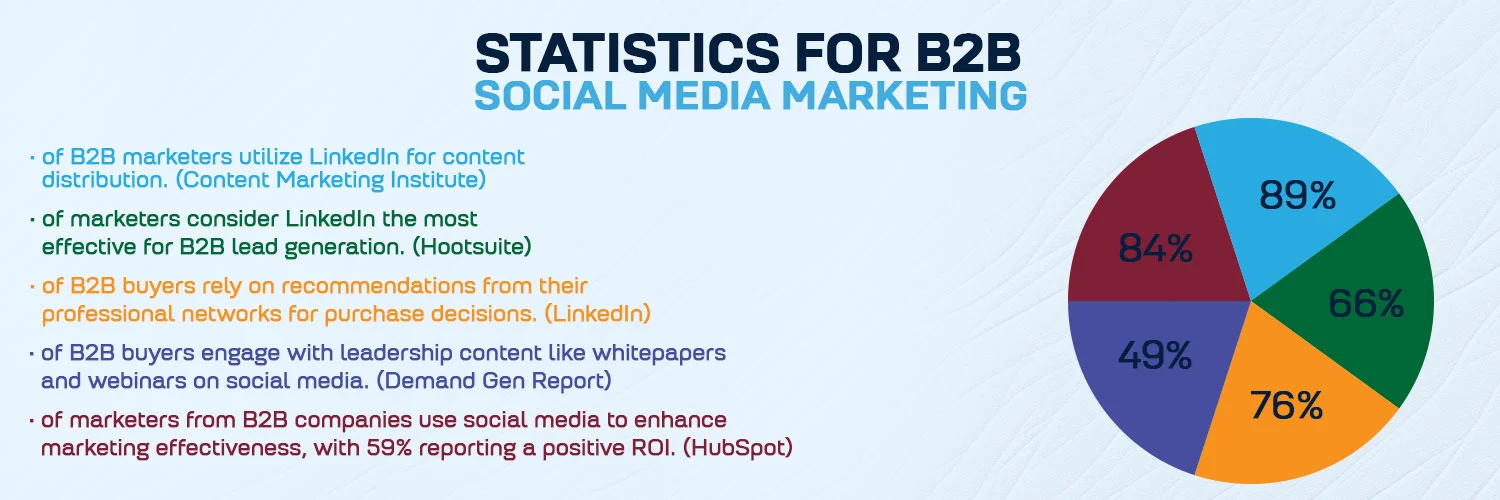
Whether you aim to amplify brand recognition, build partnerships, or generate high-quality leads, a customized social media strategy can be a formidable tool in achieving your business objectives. This guide offers a detailed roadmap for crafting and executing a successful B2B social media plan tailored to your goals and audience.
Understanding Target Audience for B2B Marketing
A deeper understanding of the target audience is essential for any marketing endeavor. For B2B firms, this extends beyond basic demographics to include industry-specific challenges, company scales, job roles, and decision-making processes.
Identifying Challenges
Begin by identifying issues your target audience faces. Conduct surveys, interviews, and market research for insights. For instance, if you offer software to financial institutions, they may be concerned with compliance and data security.
Creating Buyer Personas
Develop comprehensive buyer personas incorporating demographic details, job roles, and business challenges. For instance, targeting IT managers in mid-sized companies requires focusing on their specific concerns like system integration and cybersecurity.
Choosing suitable social media platforms for B2B
Not all social media platforms are equally beneficial for B2B marketing. Focus your efforts on platforms where your audience is most active.
LinkedIn
The top platform for B2B marketing, perfect for sharing industry insights, company news, and thought leadership content. On LinkedIn, emphasize in-depth industry insights, company updates, and thought leadership content to build credibility and connect with decision-makers. Utilize LinkedIn's advanced targeting features for precise engagement and Sponsored InMail for personalized outreach.
Twitter
Ideal for real-time updates, industry news, and influencer engagement. Tech companies often use Twitter to join industry discussions through hashtags. On Twitter, leverage real-time engagement by participating in trending industry discussions and using relevant hashtags to boost visibility. Consider hosting or joining Twitter chats to exhibit expertise.
Facebook
While more consumer-focused, Facebook can be valuable for community-building and brand visibility. Use Facebook Groups to engage niche communities. Despite its consumer orientation, Facebook can effectively cultivate niche communities via Facebook Groups, promoting knowledge sharing and strong relationships.
Youtube
Great for sharing video content like product demos, webinars, and how-to guides. Videos help clarify complex products or services in an easily digestible format. On YouTube, create and optimize video content such as product demos, webinars, and how-to guides that simplify complex information, enhancing understanding and engagement.
Industry Forums and Communities
Specialized forums provide targeted engagement opportunities. Software firms can engage developers on platforms like GitHub. Participate in discussions, offer solutions, and share expertise to establish a solid reputation within specific niches.


High-quality content is the bedrock of B2B social media marketing. Your objective should be to provide value and solve audience problems.
Educational Material
Share blog posts, whitepapers, case studies, and eBooks with actionable insights. For example, a cybersecurity firm might share content on how to identify potential threats and what steps can be taken to mitigate the risk of data loss.
Thought Leadership
Position your brand as an industry leader through thought-provoking articles and opinion pieces, including guest posts from experts or original research.
Customer Success Stories
Showcase how clients benefit from your products or services. Detailed case studies offer social proof and demonstrate practical applications.
Webinars and Online Events
Webinars provide in-depth knowledge and engage audiences. Promote these on social media and use them as B2B lead generation tools.
Interactive Content
Polls, surveys, and Q&A sessions drive engagement and offer insights into audience preferences and pain points.
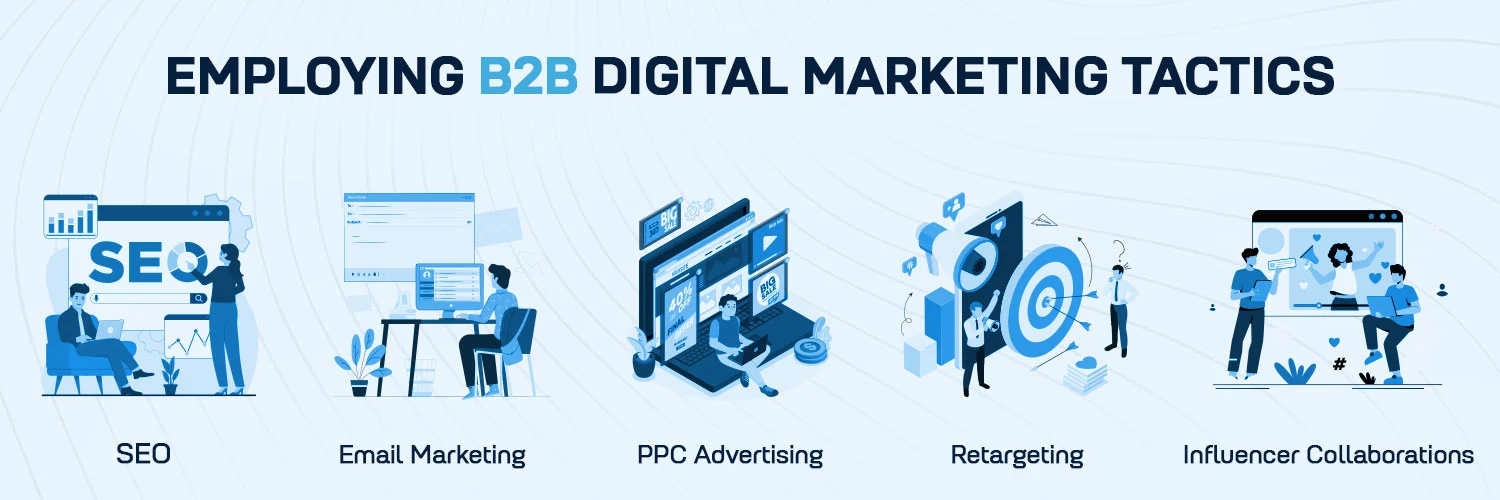
Integrate other digital marketing tactics with social media to amplify reach and effectiveness.
- SEO: Optimize social media profiles and content for search engines. Use relevant keywords in posts, profiles, and hashtags for better visibility.
- Email Marketing: Promote social media channels via your email list. Include social media links in newsletters and email signatures to encourage following.
- PPC Advertising: Utilize targeted pay-per-click campaigns on platforms like LinkedIn and Facebook to drive traffic to content, webinars, or landing pages.
- Retargeting: Implement retargeting campaigns to re-engage interested visitors. This maintains B2B brand awareness.
- Influencer Collaborations: Partner with industry influencers to extend reach. But choose influencers that align with your brand's voice and have a considerable fan following from your industry.
Engaging Your Audience
Engagement is the first step towards long-term relationships with customers. It builds trust and connects the customers emotionally.
- Active Participation: Engage with your audience beyond posting content. Respond to comments, join discussions, and show you value their input.
- Personalization: Tailor messages to address the specific needs and interests of your audience. Personalization makes your audience feel valued and encourages engagement.
- Community Building: Interact with associated people from your niche and try to build a community. LinkedIn Groups, Facebook Groups, and specialized forums facilitate peer-to-peer interactions and loyalty.
Using Social Media Analytics Tools
Track and analyze key performance indicators to measure your B2B social media strategy’s effectiveness. offer valuable insights into audience behavior and engagement
- Google Analytics: Track social media traffic and measure conversion rates.
- Hootsuite: Schedule posts, monitor engagement, and track metrics across multiple platforms.
- Sprout Social: Analyze engagement, track brand mentions, and understand audience demographics.
- LinkedIn Analytics: Gain insights into post performance, audience engagement, and follower demographics.
- Twitter Analytics: Analyze tweet impressions, engagement rates, and follower growth to refine your strategy.
Monitoring and Adapting Your Strategy
Continuous monitoring and adaptation are essential for B2B social media marketing.
- Regular Performance Reviews: Regularly analyze social media performance. Examine metrics like engagement rates, follower growth, and lead generation to determine what works.
- Listening to Feedback: Pay attention to audience comments and reviews. Use feedback to enhance products, services, and content.
- Staying Updated: Stay informed on industry trends, best practices, and algorithm changes. This helps adapt your strategy to remain relevant.
- Testing and Experimentation: Test different content types, posting schedules, and engagement tactics. A/B testing identifies the most effective strategies.
- Competitor Analysis: Regularly evaluate competitors' social media presence. Identify their strengths and weaknesses to differentiate your brand.
- Adapting to Changes: Be ready to adjust your strategy based on industry changes, audience behavior, or platform algorithm updates.
Real-World Examples
Examples of successful B2B social media marketing:
HubSpot:
Excels in creating educational content for marketing and sales professionals. Their LinkedIn posts feature in-depth articles, webinars, and case studies. HubSpot engages with its audience by responding to comments and hosting live Q&A sessions.
IBM:
Utilizes a multi-platform approach to engage its audience, sharing thought leadership content on LinkedIn, real-time updates on Twitter, and video content on YouTube. IBM’s engagement and valuable content build a strong online presence.
Adobe:
Highlights the creative potential of their products through stunning visuals, customer success stories, and tutorials. Targeted LinkedIn ad campaigns promote webinars and product launches, driving traffic and generating leads.
Salesforce:
Shares customer success stories and data-driven insights on LinkedIn. They engage with their audience through live events, webinars, and Twitter chats, fostering community and thought leadership.
AI in B2B Social Media Marketing
Artificial Intelligence (AI) significantly enhances B2B social media marketing by offering sophisticated tools and insights for efficiency and effectiveness.
- Content Creation and Curation: AI tools generate and curate content tailored to audience preferences. By analyzing trending topics and engagement metrics, AI suggests relevant content ideas or draft posts, saving time and ensuring quality.
- Audience Segmentation and Targeting: AI algorithms analyze data to identify patterns and segment audiences precisely. This enables tailored messaging, enhancing personalization and increasing engagement and conversions.
- Predictive Analytics: AI forecasts future trends by analyzing historical data and market conditions. This helps anticipate changes, understand which content will perform well, and adjust strategies proactively.
- Chatbots and Customer Service: AI-driven chatbots offer real-time responses to social media inquiries, ensuring immediate customer service and engagement. These bots handle routine questions, schedule appointments, or route complex queries to human representatives, improving efficiency and customer satisfaction.
- Social Listening and Sentiment Analysis: AI tools monitor social media conversations, track brand mentions, and perform sentiment analysis to gauge public perception. Insights help B2B companies manage reputations and respond to feedback or issues promptly.
- Ad Optimization: AI enhances social media advertising by optimizing ad spend, targeting, and creative elements. Machine learning algorithms analyze performance data in real time, adjusting bids, audiences, and ad placements to maximize ROI.
- Influencer Identification: AI identifies key influencers within specific industries by analyzing engagement metrics and follower demographics. Collaborating with the right influencers amplifies reach and credibility in the B2B space.
- Performance Analytics and Reporting: AI-driven analytics provide detailed social media performance reports, highlighting effective strategies. These insights enable continuous strategy refinement and data-driven decision-making.
- Automated Scheduling and Posting: AI tools automate content scheduling and posting across platforms, ensuring optimal timing based on audience activity. This automation saves time and maximizes engagement.
- Behavioral Analysis and Personalization: AI analyzes user behavior for deeper customer preference insights and predicts future actions. This enables more personalized interactions and content deliveries, enhancing user experience and strengthening relationships.
Integrating AI into B2B social media strategies offers precision, efficiency, and scalability, driving better results and staying competitive.
Conclusion
Creating a solid B2B social media marketing strategy involves understanding your target audience deeply, using the right approach for the right platform, creating meaningful content, and engaging with the audience. By incorporating B2B digital marketing tactics and utilizing social media analytics tools, you can generate leads, enhance consumer relationships, and gain a competitive edge.
However, crafting a tailored strategy is the key to success. A standard strategy cannot work for every business. Understand your business nature, target audience, and niche, and then craft a strategy. Also regularly monitor your performance, listen to feedback, and make adjustments to remain effective.
Ready to elevate your B2B social media marketing strategy? Reach out to SMB Business Solution for comprehensive digital marketing and Salesforce services customized to your business needs. Our digital marketing experts have crafted multiple B2B strategies for various clients. Get free from the complexities of social media marketing and achieve meaningful results for your business. Contact us!
SMB Business Solution – Your Partner in Digital Growth












